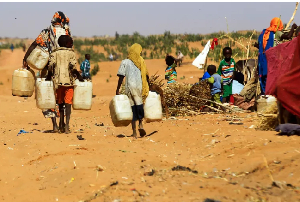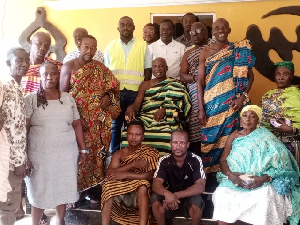activities
Navrongo (UE), Sept. 23, GNA - The chiefs and people living within the Western Wildlife Corridor, has appealed to government to intervene and save the Western Wildlife Corridor from extinction through mining activities. The appeal was contained in a communiqu=E9 issued at the end of a training workshop organised by GIA/NABIO Agro-Forestry Development Organisation, which is engaged in the conservation of natural resources. The training workshop, which attracted chiefs, assembly members, core staff of the assembly and opinion leaders, was aimed at building the capacity of the participants on mining policy and policy gaps that give room for environmental destruction. The Western Wildlife Corridor is adjacent to the Nazenga Game Reserve in Burkina Faso that shares border with the Sissala East District in the Upper West Region. The wildlife communities are Kayoro, Katiu and Navrongo in the Kessena-Nankana West District, and Wuru, Kwapun, Konchogor, Banu, Pudo and Bassissau in the Sissala East District. The mining activity is very serious in the Kassena Nankana District. The corridor was created by the colonial government to create a transit point for wildlife migration from the Nazenga wildlife reserve to the Mole National Park in Damongo, in the Northern Region. The communique explained that wildlife was abundant in the Nazenga Reserve, which brought about the establishment of the corridor to attract some of the species to the Mole Park. It called on government to stop mineral exploration in forest reserves in Ghana and in the Northern parts of the country in particular, stressing that government's dream of curbing desertification and land degradation in the area would be meaningless if the situation is not reversed. The communiqu=E9 called on government to stop surface mining in Bole, Talensi-Nabdam, Builsa and Nadowli Districts due to the climatic situation in the North. Mr Julius Awaregya Atudeko, acting Project Manager of GNADO, an environmental NGO said his outfit, in 2007 and 2009 sought funding from the International Conservation of Nature to embark upon numerous activities and programmes on environmental management and conservation of natural resources in nine communities along the corridors. Participants at the training workshop were taken through mining laws including types of mining, compensation and surface rights, payment of royalties, offences and penalties, stability agreement, access to court in respect of compensation and water rights among other issues.
Regional News of Thursday, 23 September 2010
Source: GNA












